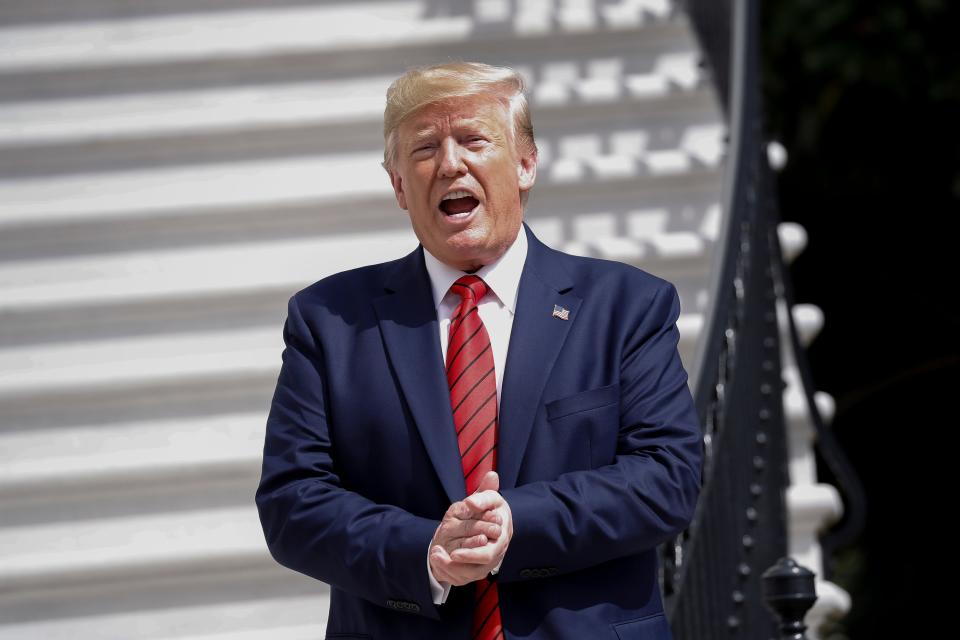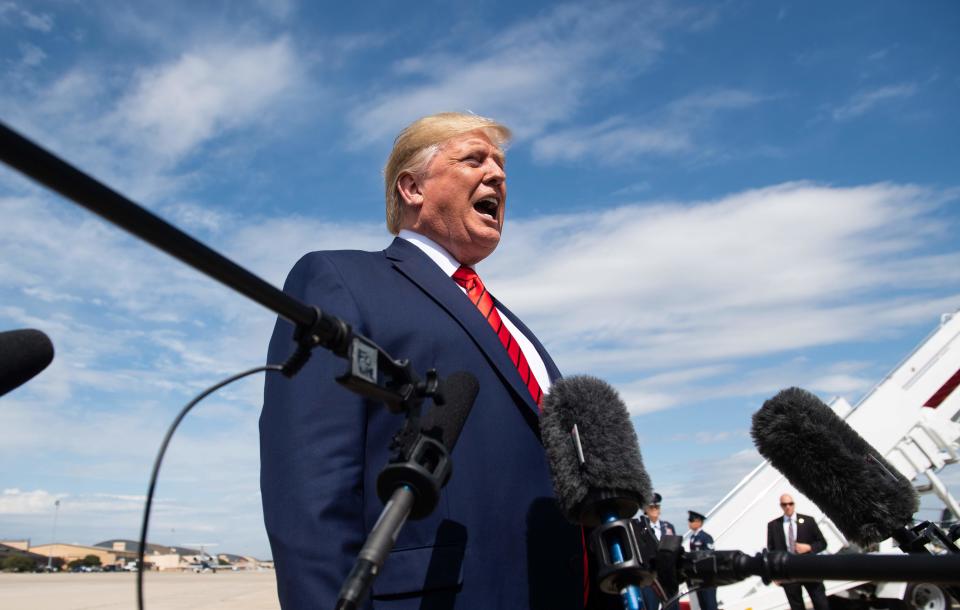Donald Trump's wary White House deals with the threat of impeachment
WASHINGTON – As the White House sought to convey a semblance of normalcy in the face of a growing crisis Thursday, President Donald Trump again attacked a new impeachment inquiry as a "disgrace" and a "terrible thing for our country."
“It shouldn’t be allowed – there should be a way of stopping it, maybe legally through the courts," Trump said as he returned to Washington after a week of activities with the United Nations in New York.
Trump and his aides moved into communication overdrive in response to the threat of impeachment. They seek to counter the newly released complaint from an unidentified whistleblower and claims that Trump improperly pressured Ukraine's president to investigate Democratic political rival Joe Biden.
After a high-profile House Intelligence Committee hearing on the whistleblower's allegations, Trump attacked the committee chairman, Rep. Adam Schiff, D-Calif., and his colleagues.
"Here we go again," Trump said. "It's Adam Schiff and his crew making up stories and sitting there like pious, whatever you want to call them."
Schiff mocked the complaints: “I’m always flattered when I’m attacked by someone of the president’s character."
As some White House aides tried to move the conversation back to other issues, Trump – operating as his own communication director – hammered Democrats, the whistleblower and the media.
Some of his aides, privately, expressed anxiety about the furor. While televisions throughout the West Wing were tuned to the House Intelligence Committee hearing, they said they try to stay focused on doing their jobs, part of which involves defending the president.
In statements and emails throughout the day, at the White House and within Trump's reelection campaign, aides argued that the complaint doesn't go much beyond what wasn't already known.But the whistleblower's report alleged Ukraine officials were aware that Trump wanted to discuss the issue before the July 25 call at the center of the controversy and said aides tried to "lock down" notes from Trump's call to Ukraine.

“Nothing has changed with the release of this complaint, which is nothing more than a collection of third-hand accounts of events and cobbled-together press clippings – all of which show nothing improper," White House spokeswoman Stephanie Grisham said in a statement less than a half-hour after the whistleblower document was released.
Some White House aides expressed frustration that reporters were focused on Ukraine and impeachment rather than the economy and immigration.
"I know there’s a big hullabaloo,” White House economic adviser Larry Kudlow said as he faced a litany of questions about the impeachment inquiry. “I don’t see anything.”
Trump declined to take questions throughout the day. White House reporters were summoned to the South Lawn for an unscheduled event Thursday evening that turned out to be a photo-op with the president and law enforcement officials. The officers broke out into applause and chants of "U-S-A" as Trump waved to reporters, who shouted unanswered questions about the whistleblower.
Later, administration officials announced the U.S. will dramatically reduce the number of refugees allowed to resettle in the country next year – permitting no more than 18,000 people fleeing war, violence and persecution.
And Trump's campaign announced a rally in Minneapolis next month.
Refugees: Trump sets lowest cap ever on refugees
'I thought it was dead': Trump says he thought threat ended with Mueller report
Grisham and other aides stressed that the whistleblower acknowledged he did not witness most of the events described, relying on statements from unidentified White House officials.
Aides noted that Trump released a summary of the phone call between him and Ukrainian President Volodymyr Zelensky.
The whistleblower complaint provides more details of Trump's interactions with the Ukrainian leader and suggests that Trump and aides tried to cover up his push for a foreign country to investigate a rival before the 2020 election by storing the notes of the call in a separate computer system reserved for highly sensitive material.
The whistleblower said some administration officials expressed concern that Trump "used the power of his office" to benefit himself and his reelection campaign.
Some officials were "deeply disturbed" by Trump's actions and discussed how to treat details of the call because they feared "they had witnessed the president abuse his office for personal gain," the whistleblower said.

Team Trump pushed back on these contentions in a variety of ways, including bombarding reporters – and voters – with emails, comments and social media postings.
"The president released the full transcript of his phone call yesterday. It showed nothing inappropriate, despite false media reports to the contrary," tweeted Matt Wolking, deputy director of communication for rapid response with Trump's reelection campaign.
In addition to his brief remarks to reporters, Trump used his standard method of communication: Twitter.
Though not directly addressing the whistleblower's claims, Trump sent out a string of tweets and retweets defending himself and denouncing the impeachment drive.
He wrote, "THE DEMOCRATS ARE TRYING TO DESTROY THE REPUBLICAN PARTY AND ALL THAT IT STANDS FOR. STICK TOGETHER, PLAY THEIR GAME, AND FIGHT HARD REPUBLICANS. OUR COUNTRY IS AT STAKE!"
At Joint Base Andrews after returning from New York, Trump said the phone call to Ukraine "was perfect," and "the president yesterday of Ukraine said there was no pressure put on him whatsoever, none whatsoever."
Skeptics said Trump and his communication team have their work cut out for them.
"They are just going after the process and the messenger," said Mimi Rocah, a former federal prosecutor in New York. "Because if the message in the complaint is accurate – and everything suggests it is, including the White House call summary – it’s devastating."
Trump and other administration officials sought to project the idea of business as usual, from presidential fundraisers in New York to an immigration briefing at the White House – though Trump said Democrats are getting in the way.
"They're going to tie up our country," he said. "We can't talk about gun regulation. We can't talk about anything, because frankly they're so tied up."
As Washington was glued to the testimony of acting Director of National Intelligence Joseph Maguire, the White House trotted out nearly a dozen federal and local law enforcement and immigration officials to discuss a favorite topic: immigration and so-called sanctuary city policies.
Flanked by county sheriffs, acting Director of Immigration and Customs Enforcement Matthew Albence blasted cities and counties that ignore federal requests to hold in jail immigrants in the country illegally.
Trump and other Republicans pointed to crimes committed by immigrants released by cities. The federal requests are the subject of litigation, and leaders of sanctuary jurisdictions noted their power to hold a person in jail for a civil immigration violation is murky.
“It’s time to publicly call out those who would put politics over public safety,” Albence told a sparsely populated briefing room in the White House.
Albence dismissed questions about the timing of the news conference, given the other news story consuming Washington.
“We started planning this several weeks ago,” he said.
This article originally appeared on USA TODAY: Donald Trump's wary White House deals with the threat of impeachment

